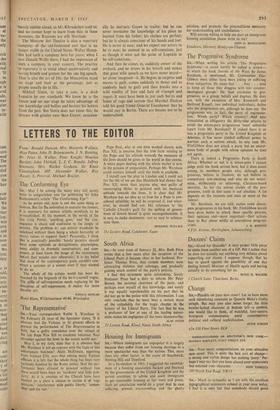The Progressive Syndrome
SIR,—When writing his article 'The Progressive Syndrome'—it could hardly be called a review—. in' which the book Suicide of the West, by James Burnham, is mentioned, Mr. Constantine Fitz- Gibbon must eithei have been joking or suffering from indigestion. He states that '. . . they . . . tend to lump all those they disagree with into counter- ideological groups.' He then attributes to pro- gressives, as a group, beliefs and dogmas. He does not, with the exception of Mrs. Roosevelt and Bertrand Russell, two individual individuals, define who the progressives are, although he does say, 'the progressives are, in fact, the party of regimenta- tion.' Which party? Which country? And who formulated as obligatory the thirty-nine articles to which the simon-pure progressives 'must' subscribe (apart from Mr. Burnham)? If indeed there is or was a progressive party in the United Kingdom or America, it has never yielded sufficient power to warrant such a serious attack. In any case Mr. FitzGibbon does not attack a party but an anony- mous body of people with whose opinions he does not agree. There is indeed a Progressive Party in South Africa. Whether or not it is simon-pure I cannot judge until the book arrives here, but it does count among its members people who, although pro- gressives, believe in freedom, do not believe in compulsory non-smoking and who do not under- mine, deliberately or otherwise, Christian-based morality. As for the untrue clichés of the pro- gressives, truth in this sense is not absolute. A lot depends on the interests and state of mind of the listener. Mr. Burnham, we are told, names some simon- pure progressives in his book. Mr. FitzGibbon Would have done better to attack these specific persons, their opinions and—more important--their actions than to flay about wildly at amorphous progress-


































 Previous page
Previous page